Ss plex Error Message Please Try Again
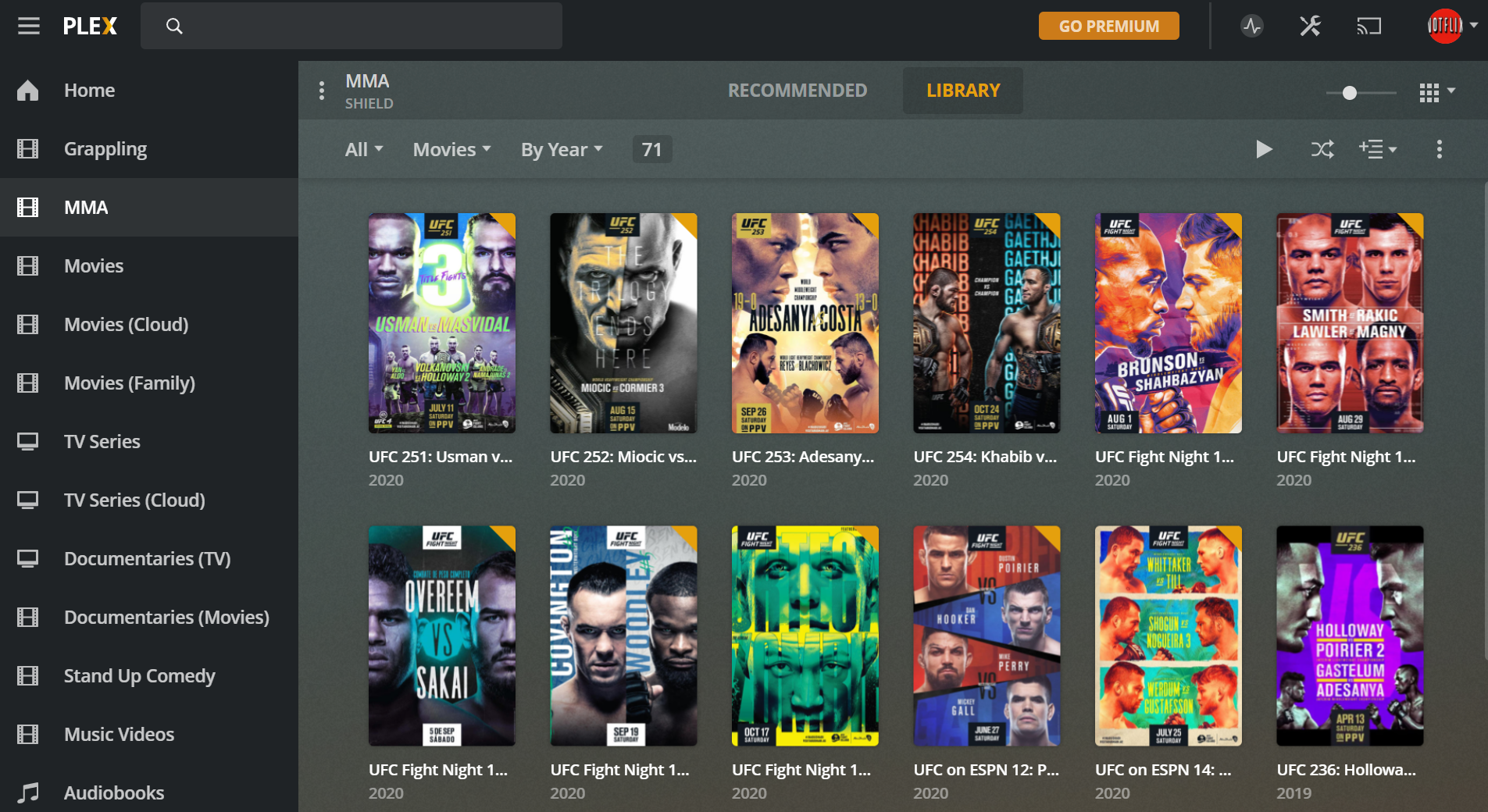
It's very easy to get started with Plex, just as you add together dissimilar types of content and grow your libraries, information technology becomes more than and more complicated to keep everything tidy and like shooting fish in a barrel to employ. I have 150TB+ in Plex organized in a dozen different libraries, learned a lot along the mode, and will share my notes in this entry.
Over the past decade I went back and forth between Plex and Emby as my media server of choice but eventually settled on the former afterwards I switched my server from my desktop PC to an Nvidia Shield, then to a Docker container in a Synology NAS. It'due south been a long journey and I hope to accelerate your own learning bend.
The ways we are interacting with a tutorial, audiobook, movie, or Boob tube serial are all very different, and it takes work to bend Plex to exist a good fit with all these scenarios. If you take to take anything from this post, it'southward that each type of content needs its own library with an arroyo that'southward finetuned to it.
As much as I try to apply automation and rely on Plex's native features, to achieve the best results exist prepared for some grunt work to get more obscure content organized neatly and in line with how it's meant to exist consumed.
I attempt to steer away as much as possible from organizing or tagging content via the Plex UI, equally that metadata won't survive if you take to rebuild a library from scratch, which over the years is probable to happen eventually. Instead, metadata is best conveyed via 1) your binder/file arrangement and naming conventions, 2) by metatagging source files themselves, and/or 3) with helper text/json/xml files to exist parsed by Plex agents or scripts. But in that location'southward some genre and collection metadata that has to exist input via the Plex UI.
If y'all're not willing to brand that effort, well, garbage in garbage out, you'll get out of your libraries what you lot put into them. And the more content you add, the more than you'll need information technology to be organized or the whole matter will collapse nether its own weight.
As a caveat before nosotros move on to the meat of this entry, this post is non most streaming or transcoding. I'm using Plex in Directly Play on my LAN and practice non care most serving depression-quality transcodes to the entire neighborhood as some people seem keen to do. (I'thou not judging, it's just that I'k not interested nor experienced with this use case).
1. Matching Recalcitrant Documentaries, Television Shows, Movies, Sports etc.
Provided y'all apply the recommended naming conventions (Television, movies), Plex is usually adept at auto-matching and fetching the right metadata, especially since the new movie scanner and agent were introduced with PMS i.twenty. Even so, some content types tin be tricky and tiny punctuation variations tin throw the agents off (due east.g. you can't put colons in Windows file names), likewise every bit titles in other languages than English. Follow these guidelines to save you a lot of grief, depending on the type of content you plan to collect.
1.1. Documentaries Are Not All the Same, Or Are They?
Documentaries can't exist all dumped in the aforementioned library. Instead, make sure to put standalones (e.chiliad. Tropicália) in a Movie library while serial (east.g. Chef'due south Table) should exist in a split up TV library. Some are catchy as you may think they're standalones but they're really part of an extended Tv set series of sorts (e.g. content from National Geographic). Await upward these loose ends in TheTVDB and IMDB TMDB then make up one's mind whether to put them in your TV or Movie documentary libraries appropriately (edit: someone pointed out I fabricated a mistake, it looks like IMDB is used by Plex only for ratings, like Rotten Tomatoes).
After I initially posted this entry someone brought Colima to my attention. I think I'll stick to my approach, but it's practiced to have options:
"Combined Library Metadata Agent (Colima) in combination with Absolute Series Scanner (ASS) allows you to accept movies and tv shows within the same library, something that Plex sadly not supports out of the box. Mutual scenarios to use this agent for are documentaries, western and Japanese animation libraries."
Colima.bundle README.md
To automatically enforce Plex's naming convention on TV shows, utilize a tool such as Sonarr, Filebot, Telly Rename, or Rename My Tv Serial. Television shows should lucifer in most cases if they're properly named, but in the rare case that they won't, find the offending series in TheTVDB then forcefulness a match past ID. With the new Plex TV Serial agent, you might need to append "thetvdb-" to the ID.
You can do the same ID matching with IDs from TMDB in movie libraries. Picture show libraries likewise work for stand-upward comedy shows, which I chose to ready a carve up library considering for me it'southward a different mood, time commitment, and audience than watching a regular movie. This is why I also have a split up library for family movies simply from a technical perspective you don't take to use separate libraries in these cases, it's more than of a convenience. (I fabricated that structural choice before the addition of Smart Collections, which we cover later on in this mail service).
1.3. Support for Music: OK, Not Great
Plexamp is a pretty cool histrion for Pass subscribers, simply information technology'south limited by Plex's limited metadata support on the backend. The lack of support for composer and conductor cripples classical music collections, while the absence of producer and remixer fields may get out electronic and rap collectors wanting (related thread). Regular albums in mainstream genres will get picked up, ofttimes with covers and lyrics, provided yous stick to the naming convention.
Dedicated music server Navidrome should eventually address these shortcomings, but as of September 2021, this "will equire a pretty major refactoring of the database […] and volition impact a lot of the UI also, we don't have a timeline for that still."
i.4. Sport Events: Welcome to the Big Leagues
Your mileage may vary with sports depending on whether private events can be found in Tmdb or TheTVDB. UFC fights for instance are recognized if you ready them in a moving-picture show library. Here'southward a reddit thread discussing successfully handling Formula ane seasons and here's a thread about NBA/NFL, and another nearly NBA. A similar approach may or may not work for your sport of selection depending on how mainstream information technology is.
1.5. Anime, Music Videos, and Other Miscellaneous Content Types That People Somehow Desire in Plex
It'due south impossible for me to track all the ways people employ Plex, equally in that location are many niches I have no involvement in. Some people want to handle family videos, travel pictures, radio shows, podcasts, ebooks, comics, picture trailers, etc., including things that I think are much ameliorate handled past other dedicated content servers such as Calibre Spider web or Komga. There's a whole subreddit and website simply for preroll videos!
I load Anime in a regular TV Shows library but then I take a tiny library, if information technology's something yous're more serious about there an agent called HAMA.
For long music videos I use a Moving-picture show library, this works well for most operas and concerts. If you want to collect brusque MTV-style music videos, your approximate is equally good as mine, possibly expect into the Shorts department later in this entry.
2. Getting the Best Experience for Tutorials: Use mp4 Tagging or a Custom Amanuensis
Multi-part video tutorials is the content blazon I plant almost catchy to handle, as the big public databases don't have metadata about them. There are two main approaches to this challenge, each with their pros and cons. Once more, you desire to refrain from doing a lot of piece of work via the Plex UI as yous'd accept to redo it all over again in instance you need to rebuild your library for any reason. With computers, nothing is permanent so plan accordingly.
A starting time circular of trial and error led me to using collections with the following settings:
- Library blazon: Movies. If you use Other Videos you lot'll accept to merge video parts manually in Plex, which would need to be redone if you always have to reset said library, which in my experience is bound to happen.
- Scanner: Plex Moving-picture show Scanner.
- Agent: Plex Movie (legacy).
- Hide items belonging to collections (stacked content is based on Collections).
- Rename files with a tool such as Wink Renamer, following the "- partx.ext" convention.
- Group parts of the same tutorial under the aforementioned "album", by tagging files with mp3tag. This works on mp4 video files so if you have AVIs or MKVs you'll want to convert them with VLC or Handbrake kickoff.
- For categorization I don't employ tags, which never got any love in the Plex UI, but rather self-defined genres.
- Y'all can add together specific artwork for each video segment (i.e. if you have dissimilar files within the aforementioned tutorial), which will make information technology easier to pick the right one among the twenty parts of a long tutorial. Some media players such as mpv make it very easy to save screenshots in i keyboard shortcut.
- You might need to generate your ain posters every bit tutorials well-nigh underwater archery or Roblox origami are not necessarily going to come with something good looking for Plex purposes. The expected attribute ratio is 1:1.5.
This turned to be a manageable simply non entirely satisfying workflow in the backend, and the cease consequence in the frontend is a decent but not optimal user feel since navigating a large library will mostly have to exist done via the Collections tab. There must be a amend way!
As an alternative, a neater organisation may be obtained by following the TV show/flavor convention, and even more command can be supplied by custom agents. It's a shame that Plex stubbornly lacks support for long-established .nfo files, just people accept been complaining about it for years to no avail and so I'k not property my jiff. I tested four options and take adopted ane that concluded upwards being as close to my platonic requirements as it'south going to get.
- Personal Shows Metadata Amanuensis – this is the best selection I found for tutorials. Its meta.json format supports genre tags, studio, and cast, but it could exist more thorough equally at that place was initially no support for some fields such as collections, tagline, or originally available date… I edited the Python source code to add together these fields, a tweak that the author then officially added to his repository. If you're willing to do the legwork to conform to the TV bear witness structure and naming convention required by this amanuensis, then the upshot is very satisfying.
- Extended Personal Media Shows Agent (forum thread). Like the previous 1, it unfortunately doesn't leverage agents that harvest mp4 tags and there's no way to gear up bandage (actors/directors), Genre, or Studio. This agent relies on following a specific naming convention with optional .summary and .metadata files.
- XBMCnfoTVImporter – This plugin is meant recognize the type of nfo files used past Kodi, just documentation is nonexistent so while this is probably a good option, prepare to fumble in the dark.
- AvalonXmlAgent – inspired past XBMCnfoTVImporter, but with a different XML file format. Looks good just doesn't handle flavour titles. My first effort with information technology didn't work also well though, I retrieve I'll stick to the Personal Shows Metadata Agent.
- Local Assets-Metadata Double Agent (forum thread) – similar in spirit to the above but with the added twist of letting you relieve Plex Metadata locally (i.e. it does import/export).
The agent-based approach is too what I'd recommend in case you want to organize your own home photos or videos. For photos there'due south an autotagging selection but it'southward calling a tertiary-party service – which you may not want to exercise for privacy reasons – you need Plex Laissez passer to exist able to use it, and it's reportedly no lucifer with Google Photos's confront recognition.
For the best result with custom cast members, salvage square .jpg pictures of close-up mugshots in a dedicated spider web binder. Common deject services such as Google Drive or OneDrive make this way too difficult for some reason, I serve these images via a local web server on one of my Synology NASes.
3. Audiobooks: One of the Most Challenging Use Cases with Intricate Solutions
Dedicated support for audiobooks is one of the summit open feature requests but so far, they however require that y'all jump through similar hoops equally tutorials for the most part, except equally a Music library and using a special-purpose agent. The main drawbacks of using Plex for audiobooks are that:
- On the frontend side, the official Plex clients are not the best to keep runway of progress fourth dimension beyond devices and other UX niceties specific to listening to audiobooks.
- On the backend side, Plex doesn't provide an agent/scanner philharmonic for audiobooks like they're doing for TV shows or movies.
For details on the intricate workflows necessary to get the best outcome, see:
- Audiobook Guide 1 – macr0dev
- Audiobook Guide 2 – Seanap – more recent than the previous 1, amid differences it at present leverages the new audnexus data aggregation API via this agent.
- Play audiobooks outside of Aural on Alexa devices
- Alternative approach for multipart audiobooks using mp4s in a Shows library.
To listen to audiobooks on mobile devices, check out:
- Relate Audiobook Player for Plex – Android only, decent pick.
- Prologue – I hear expert things almost information technology merely I wouldn't know firsthand as iOS merely
- Bookcamp: app for iOS and Android with Plex backend support, it'due south in early access every bit of the cease of 2022 and looks slick. It'due south a paid subscription. I haven't been able to get it to observe my audiobook library even though my Plex server is attainable from the outside and I successfully linked the app to my Plex account.
A significant limitation of audio libraries is that unlike Movies and Shows they don't support collections.
There'south no built-in style to tell apart movies with a commentary track at the library level considering the audio stream metadata is not leveraged for navigation. Some people utilise MKVToolNix or ffmpeg (using ISO codes) to set the commentary soundtrack to a rare linguistic communication such as Icelandic, while others propose Tautulli but that seems clunky at best. Alternatively, you could employ sharing labels, which require Plex Pass, or create a "Commentary" tag within Genres or Collections. I elected to do the latter, only didn't want to maintain information technology manually through the Plex UI, so for a long time was stuck without an adequate solution.
That changed in March 2022 when the author of Plex-Meta-Managing director (more on that tool further below) added support for filtering by audio_track_title at my request, which takes care of the commentary track. In your Movies.yml metadata file, have a department like this (be careful with indentation every bit the dastardly YAML language is looking for excuses to fail):
collections: Movies with Commentary: plex_all: true filters: audio_track_title: Commentary sync_mode: sync collection_order: release summary: Movies with commentary audio tracks from the manager or critics. If you lot wanted to create collections by audio track codec (AC3, DTS etc.) as someone asked in the comments below, this is likewise the mode to go.
4.2. Use Smart Collections to Dynamically Categorize Content According to Search Filters
For all the metadata exposed past the Plex search user interface, y'all don't need the same script. Simply configure an advanced search and salvage it as a smart drove, a feature added in Apr 2022 that was a dandy improvement to Plex.
I've used smart collections to categorize documentaries past genre: Arts, Music, History, Nature, Science, etc.
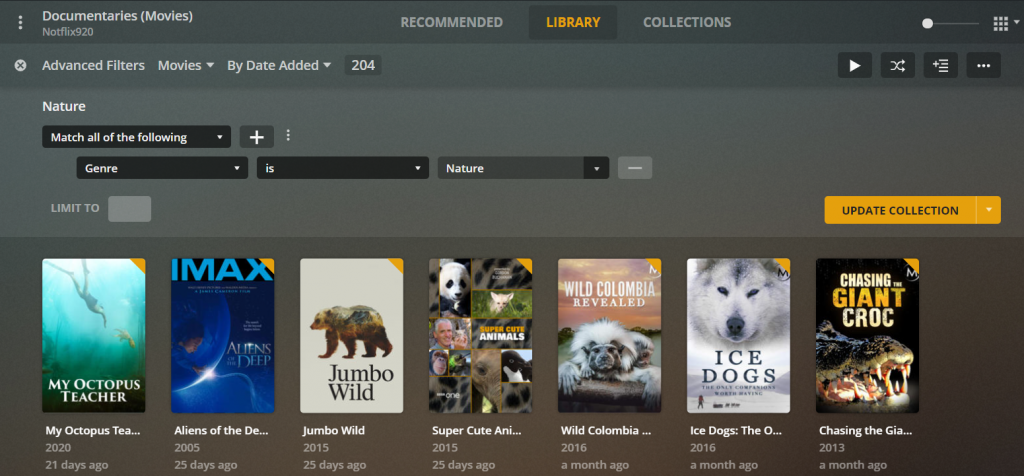

four.three. Manual collections Are An Effective Way to Handle Unlike Audiences Inside the Same Account
I also set up collections manually (i.east. not based on filters) past audience, i.due east. content for the entire family, that simply my wife watches (mystery and police procedural galore!), that I spotter together with her, or that nosotros lookout with our daughter but our son is not interested in. That way, depending on who'south in the mood to watch a Goggle box episode or movie, nosotros can narrow the choice downwards to that specific audition. And my wife can showtime watching new shows I downloaded for her without accidentally watching something I intended to sentry too. I already have enough libraries as it is without creating libraries past genre or audience!
4.4. Short Movies Are a Conundrum
I haven't started collecting shorts withal, merely knowing myself, I'll probably become into it at some point. The chief challenge is that y'all might have hundreds or thousands of shorts if you get into collecting old cartoons, and you're likely non to like overwhelming your regular Boob tube or Movies libraries with them. My initial research led to this thread and others similar it and led me to believe that the chief approaches are:
- Utilise a Boob tube library, as some shorts (mostly cartoons such every bit Pixar shorts) are in TheTVDB
- Use a movie library for those shorts that are in TheMovieDB
- Use manual collections
- Use smart collections based on Genre = Short
four.5. Playback Speed: Simply on Devices That Support Browser Extensions
Playback speed, while not strictly virtually library management per se, is something that people often desire to control for audiobooks and tutorials, and to a lesser extent sports, but despite popular demand it's withal not found in any Plex clients. There's a third-party Chrome extension – which ways information technology likewise works in Edge Chromium – simply that apparently won't work from your TV or tablet app.
If y'all must have playback speed control in mobile devices then you lot're better off using Emby, at least for the library for which you accept that demand.
Some long tutorials can exist cumbersome to navigate, while other types of content, from sport events to concerts may also do good from having delineated capacity. If you're ripping DVDs or BluRays, ChapterGrabber will assist you get chapter information from the source, and there'due south likewise the ChapterDB archive for (some) movies.
When chapter information is not already bachelor, yous tin can add your own chapter information inside videos with software such as Handbrake or Drax. In any case this needs to be done in the video files before importing them into Plex.
The power user arroyo to this task relies on ffmpeg, best combined with a helper script so that you lot tin can write a elementary text file listing your chapters and then writing them back to the video'southward metadata. The python dependency makes this overkill if yous have just a few videos to "chapterize", simply who doesn't like to spend 5 hours to automate a xv-minute transmission job anyhow? If similar me y'all're running on Windows, make sure to salve your chapters.txt file with Unix end of line characters (LF), which is easy with Notepad++, otherwise you'll terminate up with ugly rectangles at the end of each chapter's title. Hither's a recap of the procedure tweaked to my own preferences, I do at least a few at a time to get into the groove of things:
[File Explorer] Make a re-create of the video to be chapterized to your work direct and rename it input.mp4
[Notepad++ and mpv.cyberspace] Write down affiliate timestamps in capacity.txt while speed-watching through the video. Doublecheck there are no typos.
[Control prompt] ffmpeg -i input.mp4 -f ffmetadata ffm.txt
[Visual Studio Code or Python-enlightened CLI] run helper.py
[Notepad++] Open ffm.txt and convert EOL characters to Unix
[Command prompt] ffmpeg -i input.mp4 -i ffm.txt -map_metadata ane -codec copy output.mp4
[mpv.cyberspace] Open output.mp4 and navigate to each affiliate to make certain the timestamp is exactly correct and triple bank check for typos
[File Explorer] Rename output.mp4 and move it to the library binder where it's supposed to get
While you tin prepare fine art for seasons and episodes, thumbnails for chapters tin can't be set manually with local images, they're automatically generated by Plex based on each chapter's exact timestamp (related thread). Meaning that you'll have to tweak your chapter timestamps nearly by the verbal frame to become the best results. Well, that's not entirely true, you could edit the files generated by Plex in the Media folder in the backend, as explained by Noel Plum in the comments below. He'south been doing it for months without issue, only in that location's no telling whether future changes in the PMS code won't mess with that somewhen.
With MediaInfo GUI you tin can quickly check whether any given video file already has capacity, and export that list to a text file. Yous may want to practice so in lodge to edit it and reload it back to its video source in case the existing timestamps don't quite work for you (e.grand. bad preview thumbnails), or to remove or add together to the listing. The equivalent with the MediaInfo CLI is:
mediainfo.exe input.mp4 > metadata.txt The output volition need to be cleaned up and reformatted a scrap if you want to reinject it as per Kyke Howell'due south helper script mentioned higher up, but it'southward not too bad. Alternatively yous can employ ffmpeg to extract that metadata as also shown by Kyle, with the major inconvenience that timestamps are shown every bit an integer based on a timebase, or you could use mp4box from the command line, which will generate a ttxt XML file (which then needs to be scrubbed) with hh:mm:ss timestamps (that'southward the good part):
mp4box.exe "FilePath" -dump-chap >chapters.ttxt If demand exist, you can also scrub existing metadata and capacity with ffmpeg.
Also, information technology seems you can't force the generation of affiliate thumbnails then you'll take to expect for your scheduled process to kick in. Once they're rendered, here'southward what that looks like in the web UI (co-ordinate to what I read affiliate support varies among Plex clients):
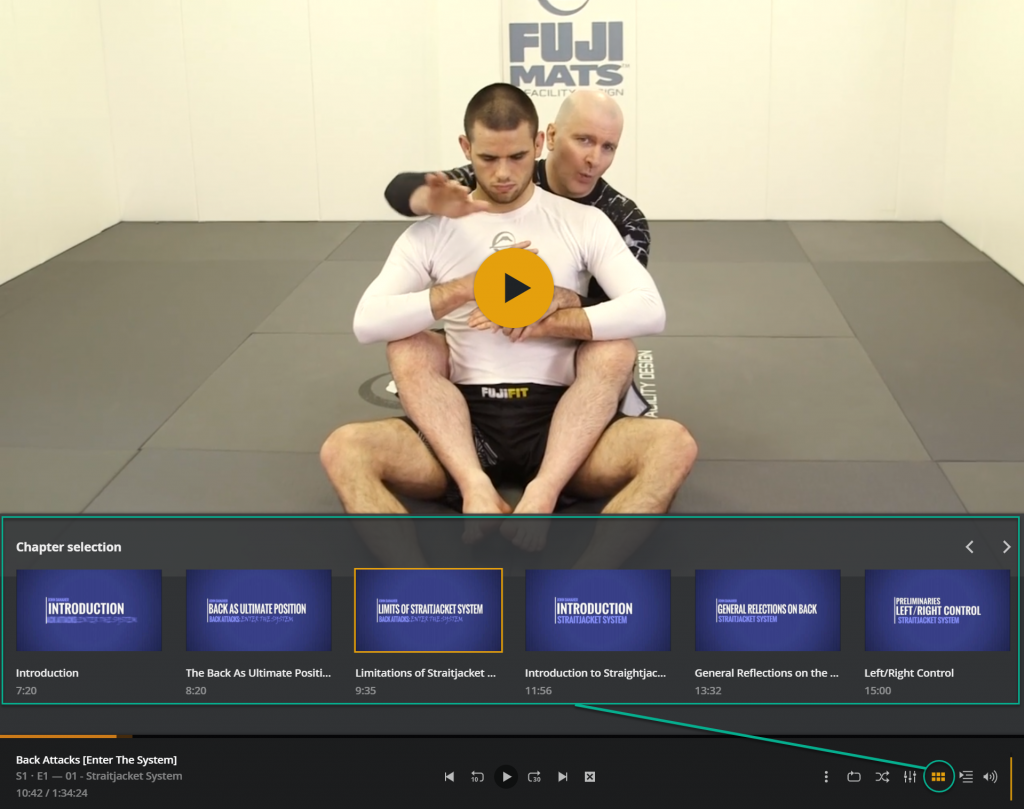
half dozen. Miscellaneous Library Customization & Management Tips
- If you want your library to look ultra clean, consider using custom posters and fanart such as those found on The Poster Database. I've used this for my thematic collections merely for individual movies I'm waiting for that site to add a Plex amanuensis and directly integration into the Poster tab shown when you edit an item. Some people fifty-fifty go through the trouble of customizing episode cards, among other reasons to avoid spoilers ("what, this graphic symbol in the thumbnail died two seasons ago?!")
- You'll probably want to customize which libraries are part of global search and featured in dashboards, i.due east. On Deck and Recently Added . That's done in the Advanced Settings of each library.
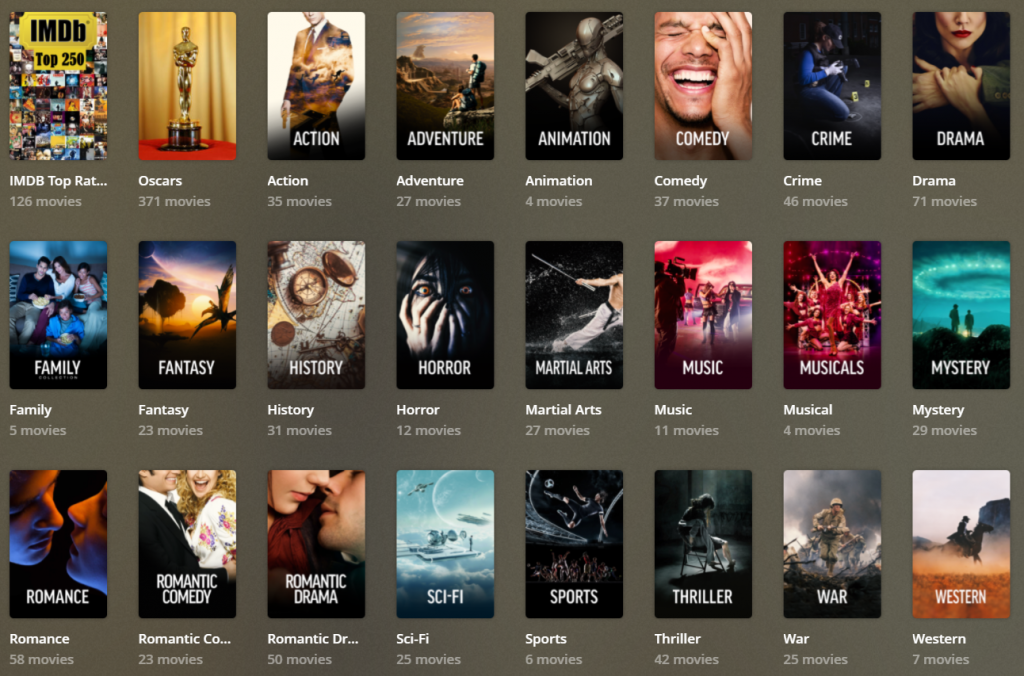
7. Library Organisation Wrap-Upwardly: Exist Deliberate & Organized
As a summary, to get your content properly organized with the minimum amount of friction, it's essential that you:
- Choose the right library media type for your content, which tin can sometimes exist counter intuitive. This ways your source content needs to be properly organized, and you tin't drop everything in one morass of a Plex library.
- Organize your content by type and follow the official naming conventions for your source folders and files.
- Figure out whether readily available scanners and agents volition do the job, or if you have to handle metadata yourself. There'southward for example an agent to handle Youtube downloads.
- Set upward each library's advanced settings deliberately equally some of the defaults can have big consequences. This is best done when you lot showtime gear up your library, though that can be edited later.
- Use collections within and across libraries for Tv set remote-friendly admission to categorized content.
- Summary of the summary: RTFM, there'southward more to Plex than first meets the heart and information technology's well worth understanding what's going on beneath the hood.
viii. Choosing What to Watch Side by side with Trakt, Moviewatch
viii.one. Continue Rail of Spotter Status and Wishlists with Trakt Integration
One of the primary criteria to choose something to watch is to filter out content you lot've already watched. Plex does continue track of that, but if you ever have to reset your library, that status is gone. Exercise you want to manually recheck hundreds of series and movies? If not, Trakt.tv gives you a mode to finer back up your watched condition to a 3rd-party service, every bit well as help you discover other content y'all might similar. There'southward built-in "scrobber" integration between Plex Pass and Trakt VIP, but that's two subscriptions you need to continue paying. If you have a bunch of distinct Plex and Trakt users, that's the way to get.
In my example, I just have one master Plex account and one Trakt business relationship, and then hither's what I ended upward doing to get the most out of the Plex-Trakt combo:
- Install the Trakt.boob tube (for Plex) plugin via the Applications section of the Unofficial App Store (UAS) in Web.Tools. Contrarily to popular conventionalities, Plex plugins are not entirely dead, I'll get dorsum to that in a minute.
- Install Kitana.
- Do an initial full sync via Kitana (unless your Trakt account is make new). At present Plex and Trakt should concur with each other on what y'all've already watched and then stay that way as you lookout new content.
- Create private watchlists in Trakt to add interesting TV shows and movies as I'm browsing that site.
- Connect these watchlists to Sonarr v3 and Radarr to automate their downloading.
- I found that I had to nudge Sonarr into processing a new list which is piece of cake plenty via its API.
- Radarr volition but handle your watchlist via the "Trakt User" list option, "Trakt List" won't work for some reason.
- With the Web to Plex browser extension y'all'll see whether you have a movie/show in your server while browsing Trakt or Imdb.
Notice out more than about the *arr automation apps in this mail. To practice the to a higher place prior to Sonarr/Radarr v3 y'all had to use Traktarr.
In summary:
- Content watched in Plex volition automatically be marked as watched in Trakt.
- Whenever you lookout something outside of Plex, just flag it in Trakt and Plex will know.
- Trakt watchlists are a good way to funnel content back into your Plex libraries if you're willing to fix the *arr infrastructure (once more come across my NAS entry, this is such a powerful stack).
A side benefit is that I was able to resync my Plex and Trakt accounts that had grown out of sync.
The just affair that I was able to do via Kodi that I tin can't practice in Plex itself is the ability to rate content right after I watched it in the media player. Looks similar that'south not possible via a Plex plugin.
8.2. Make Movie Night Fun Once again with Moviewatch
A common refrain from people with large libraries is that information technology takes them forever to find something to watch every bit they're overwhelmed by the sheer amount of choice they have. Y'all tin play with filters to narrow down options, but a very first-earth solution to this first-world trouble is Moviewatch, which gives yous and your co-watchers a Tinder-like interface to bandy through moving picture posters until there's an understanding from all parties, at which indicate you're one click away from launching the consensus movie in Plex.
ix. Managing & Extending Plex Beyond the UI: Plugins, Maintenance, Information Analysis
9.1. Plugins: Unsupported But Non Expressionless
While plugins such as Web.Tools are no longer supported in the Plex UI, they still piece of work in do. As I but mentioned, i big piece of functionality they permit is complimentary bidirectional integration with Trakt.
As a complement, Kitana provides a spider web frontend to these plugins (how to install Kitana via Portainer) which comes handy in some cases.
ix.ii. Maintenance & Backups: Practise It Or Else
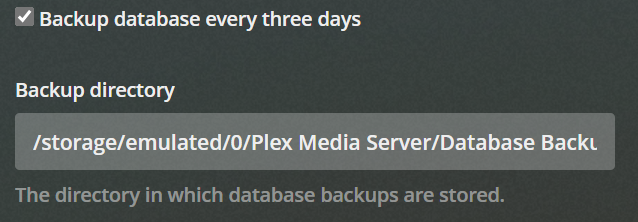
Plex Media Server occasionally stops for obscure reasons such as version updates. Scheduling server maintenance may relieve y'all hours of setup time if your Plex database becomes irremediably corrupted, which tin happen in case of sharp shutdowns, then information technology'south highly recommended to put your server backside a UPS.
Restoring from a backup is very piece of cake.
ix.3. Programmatic Access for Large Scale Management
There are several means to automate functions of the Plex server:
- Plex-Meta-Manager is "a Python 3 script that tin can exist continuously run using YAML configuration files to update on a schedule the metadata of the movies, shows, and collections in your libraries besides as automatically build collections". I've used it to build a diverseness of collections such as Movies with commentary, Oscar winners, or Imdb 250. This is a game changer if y'all take more than 2,000 movies like I practice.
Note that collections kind of span across libraries, fifty-fifty if they have dissimilar types, so y'all tin for instance accept a Star Trek drove that includes movies and Tv set shows.
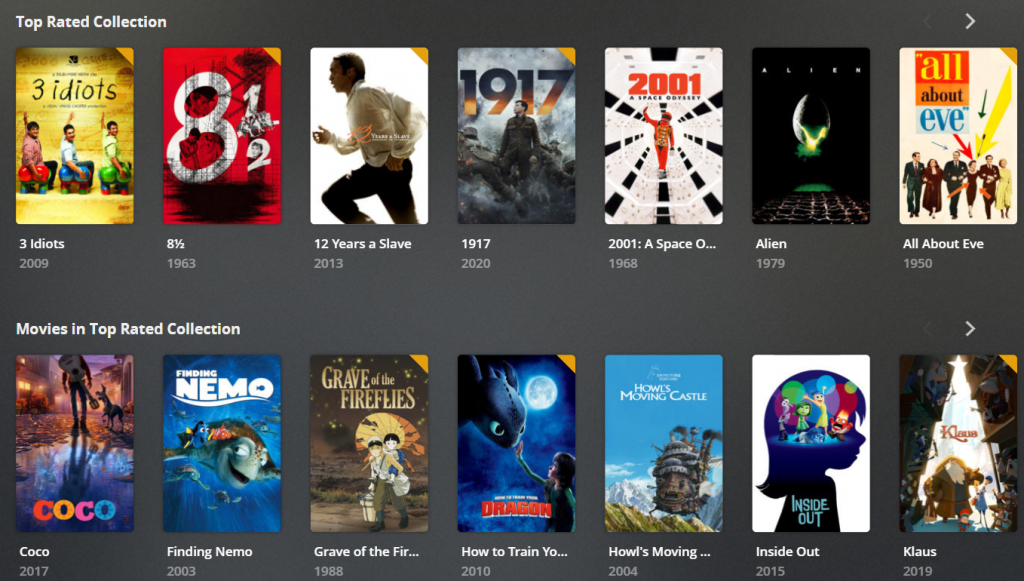
- Plex-auto-genres: in the aforementioned spirit that the previous script, less involved but less powerful.
- Gaps: "Observe the missing movies in your Plex Server."
- PlexAPI, a set of unofficial Python bindings whose goal is to "lucifer all capabilities of the official Plex Spider web Customer", including navigating libraries, performing library deportment such every bit scans, remote command, and listening to notifications. A collection of scripts that use this library can be institute in this Github repository.
- Python-PlexLibrary, a "control line utility for creating and maintaining dynamic Plex libraries and playlists based on 'recipes'."
- An API that I haven't tested yet.
- Webhooks that require Plex Pass.
- RPA software that captures how y'all interact with a website or desktop app, such as Power Automate. I'd pursue this only if all else fails, but it'south an pick.
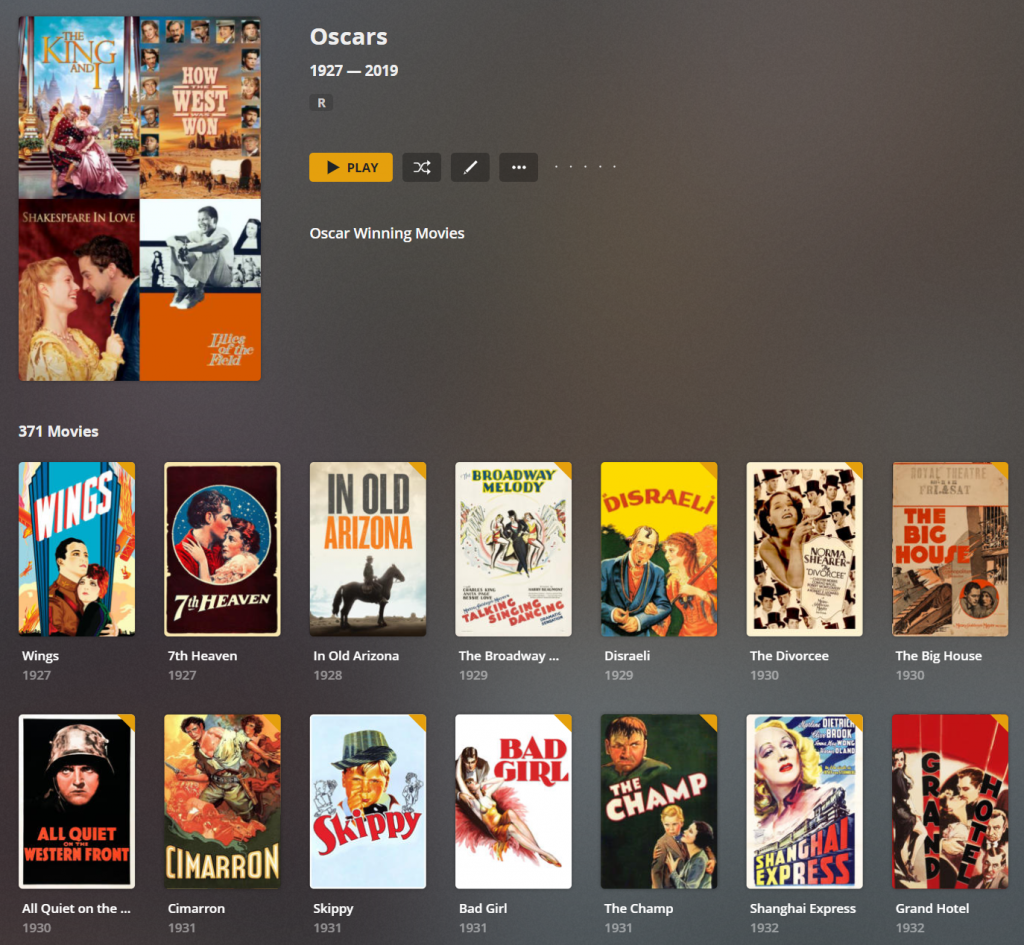
nine.4. Querying the Plex Database for Avant-garde Analytics
Plex stores its data in an SQLite file, which has this schema that you can query like so. I've used this to visualize my library in Microsoft Power BI as per the screenshot below. If you're going to practice this, piece of work off a re-create of the database just to be safe.

A low-tech alternative is to use ExportTools to generate a CSV.
Finally, many people use Tautulli to monitor their Plex server (I do so via a Docker container on my Synology NAS), though information technology's focused more on analyzing viewership than library content.
- Getting the Nigh Out of Your Synology Networked Attached Storage: Did You Know It Tin Do That? You'll learn how to run Plex and its friends (Sonarr, Radarr, Overseerr, Tautulli, etc.) in Docker and much more.
- Things I Found Out the Hard Style to Get the Nearly of the Nvidia Shield. The Shield is an excellent Plex thespian and a decent entry-level Plex server.
I started a thread on Reddit mentioning this post, lots of skillful feedback in there that I reflected above through many iterative edits.
Source: https://www.oliviertravers.com/plex-complex-libraries-ultimate-media-server/
0 Response to "Ss plex Error Message Please Try Again"
Post a Comment